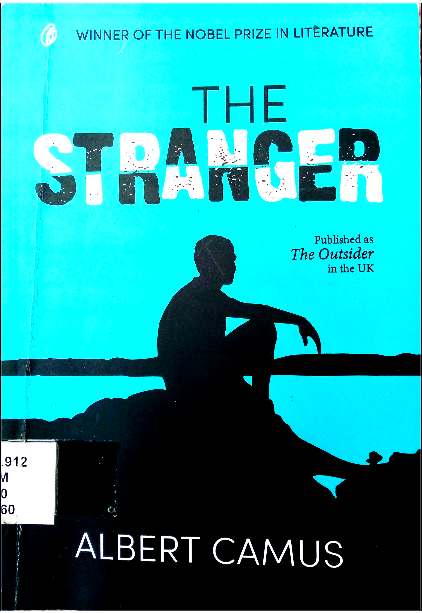Book Review — The Stranger

The Stranger by Albert Camus was published in 1942 and it is a fictional embodiment of his “theory of the absurd” alternatively known to contemporary philosophers as “Absurdism”. Through this novel, he portrays a story of an Anti-Hero which goes on to validate his theory of the Absurd. Just like Sisyphus, the protagonist of this novel embodies the feeling of absurdity. It is one of his most powerful works as we see the Stranger unravels why he is an “Anti-hero”.
The character title of the Stranger is Meursault who lives in Algiers. His story begins when he gets the sad news of his mother, Madame Meursault’s death. He settles her mother in the “Home” for the old people in the city of Marengo, three years ago, because he understands his expenses would fall insufficient to provide his mother with the best living conditions in Algiers. He also acknowledges the fact that it would be uneasy for her to settle in the “Home” for the first few years but with time, she would find her new friends in the “Home.”
Since he is an anti-Hero, Camus portrays him to be living without appeal. The warden at Home, his mother’s friends, etc. notice his silence when he visits Marengo to spend one last day with her mother before her funeral. His most uttered response in the entire novel is “No”. Whenever he is provided with activities that would result in the vindication of his emotions, duties, etc., or of the people around him, all he says is “No”.
In this sense, as Camus pointed out in the “Myth of Sisyphus”, he is keeping the “absurd alive” by living differently. This makes people curious, and they take note of his abysmal indifference. He is a stranger in the events that take place around him and in his life so with his intellect, he introspects his doings, and feels embarrassed sometimes for saying “No”. He is a stranger in his friendship and relationship whether it be platonic or romantic.
One may wonder if this is only natural for him to drown in the silence when he visits her mother to pay her tribute one day before her funeral. That he does not want to engage in sympathetic conversations and just wants to remain silent and remember. However, as the novel progresses, we understand that this indifference encompasses his whole life. He visits Céleste’s restaurant quite often and founds the owner to be his distant friend because he is aloof, but he acknowledges the sympathetic assistance the owner provides him.
The story includes two people who engage with him as they live in the same apartment complex, Old Salamano, and Raymond. Salamano is portrayed to have an absurd but genuine relationship with his dog. Raymond is portrayed as an absurd character himself because he appears to the outside world as a warehouseman, yet he makes money via morally questionable activities. This makes Raymond has various grudges against the Arab people who reside in Algier. Raymond hatches a plan for a vendetta against a person with whom he has a complex relationship. Raymond explains this to the stranger, and that ends up in him getting involved which ultimately will lead him to commit a crime that he believes was a coincidence and occurred by chance. The stranger falls into a relationship with Marie, and Camus portrays how this is a constant struggle for the stranger, a revolt against his indifference which he continuously reminds himself whereas he continues to remember Marie.
The Stranger finds out it is not just a crime that he wants to exonerate himself from. It is much more about him that his crime because of his abysmal indifference. I believe Camus develops a bridge between being callous and being indifferent to the stranger. He is indifferent but not callous. If he was callous, he would cease to be an anti-hero. He reminds himself that his “dusk comes to him as a mournful solace”. It is there in the prison before his trial he questions himself about what liberty and privation mean to him. Before his trials, he begins to see hints of why his indifference found its way to prison. He says the following:
“And so, I learned that familiar paths traced in the dusk of summer evenings may lead as well to prisons as to innocent, untroubled sleep.”
After his trial, he acknowledges the dark winds from his distant future as he says the following:
“From the dark horizon of my future a sort of slow, persistent breeze had been blowing towards me, all my life long, from the years that were to come. And on its way, the breeze had leveled out all the ideas that people tried to foist on me…”
Note that the difference and the change that appears in him from his two sayings before and after the trial represents stark certitude. This is one of the fine examples of how Camus portrays stunning developments in his character. Every subtle “No”, that he mutters to the most ordinary appeal leads him to a difference that is a world apart in comprehension prior to what he believes would happen.
He provides me with clues about what it means to be exonerated, from himself and from life. The difference is the abysmal bridge that stretches from “indifference” towards life and being “callous” in life. This is one of the most fascinating novels where “the stranger” explodes into a supernova by providing a stunning and shocking justification for why the dark winds do him no harm. He serves to be the personification of the “Stranger”. Hence, Albert Camus provides us with an example of his embodiment of Absurdism that he finds in the “Stranger”.
Some of my favorite quotes from the novel are as follows:
🌻 Certainty was something that I could get my teeth into-just as it had got its teeth into me.
🌻It was better to burn than to disappear.
